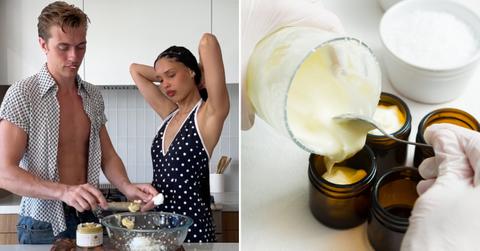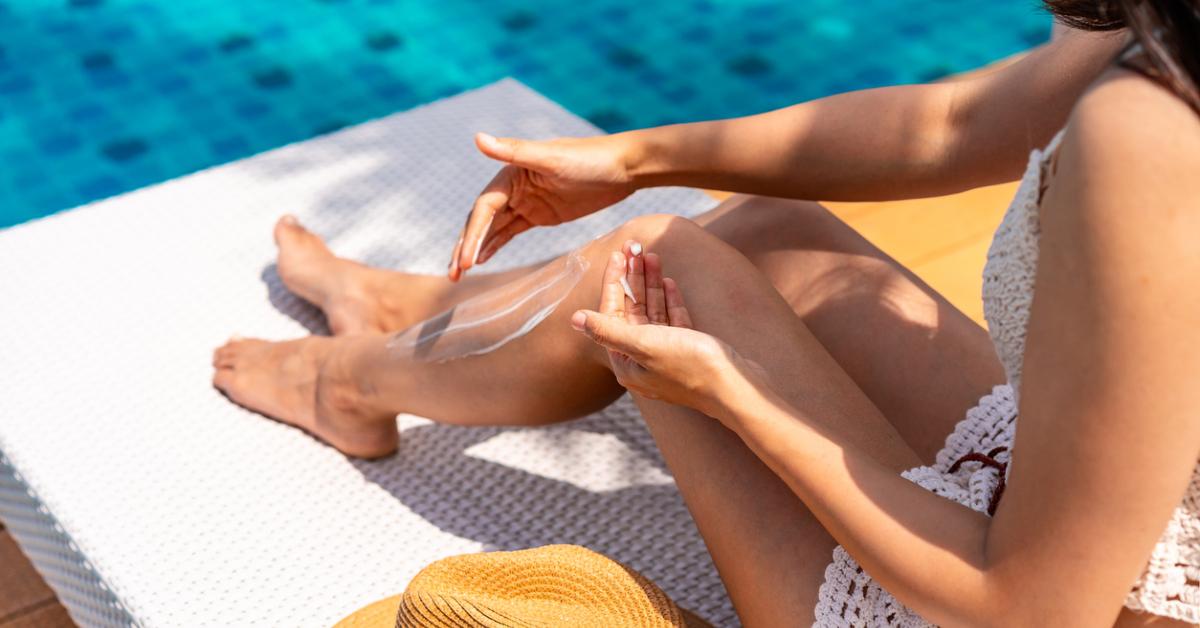"Inadequate Sun Protection" — Dermatologist Speaks Out Against DIY Sunscreen (Exclusive)
"Without proper formulation and testing, there's no way to ensure that a DIY [sunscreen] mixture will provide the necessary protection," Dr. Hannah Kopelman exclusively tells Green Matters.
Published July 3 2024, 1:11 p.m. ET

These days, TikTokers seem to think they're cosmetic chemists, throwing active ingredients into bowls with various emollients, mixing concoctions like they're brownie batter, and pouring their "formulas" into aesthetic-bait jars. And while a homemade body lotion made with ingredients like shea butter, coconut oil, and vitamin E is virtually harmless, DIY sunscreen is another story.
More specifically, a June 2024 TikTok by model and controversial lifestyle creator Nara Smith took the internet by storm. Viewed over 18.6 million times as of this writing, the video features her husband, model Lucky Blue Smith, making DIY sunscreen with coconut oil, beeswax, shea butter, cocoa butter, jojoba oil, and zinc oxide powder.
Many board-certified dermatologists flocked to the video, immediately shutting down DIY sunscreen as a safe and effective method for sun protection. And though we don't typically go to tradwife influencers for skincare advice, others may follow suit, slathering their faces with questionable mixtures and potions.
So is DIY sunscreen safe? Green Matters spoke exclusively via email with dermatologist and hair surgeon Dr. Hannah Kopelman about DIY sunscreen efficacy and the rise in DIY skincare influencers.

Is it safe to make your own sunscreen?
No, it's not advised to make your own sunscreen — for a number of reasons. Read on for what dermatologists have to say about the matter.
A dermatologist we spoke with strongly advises against participating in the DIY sunscreen trend.
"The formulation of sunscreen is a complex process that requires precise concentrations of active ingredients to ensure effective protection against both UVA and UVB rays," Dr. Hannah Kopelman exclusively tells Green Matters. "Homemade sunscreens often lack this precision and consistency, leading to inadequate sun protection."
She says exposure to UV radiation increases the risk of sunburn, premature aging, and skin cancer.
"DIY sunscreens might not be stable or uniformly mixed, further compromising their effectiveness. The potential for uneven application and unreliable SPF means that you might think you’re protected when you’re actually not," she continues.
Dermatologist and TikTok creator Dr. Angelo Landriscina, aka @Dermangelo, deemed videos like Nara Smith's "really irresponsible."
"Making some sort of oil-based solution and then dropping zinc oxide in it does not equal a sunscreen," he said in a TikTok video.
Dr. Kopelman tends to agree.
"While zinc oxide is indeed an effective physical blocker of UV radiation and is used in many commercial sunscreens, simply adding it to various emollients at home doesn't guarantee adequate sun protection," she tells us. "The concentration and distribution of zinc oxide must be precise to ensure even coverage and efficacy."
Dr. Landriscina mentioned that there are many other ingredients added to commercial sunscreen formulas that make them effective in areas other than UV protection, including areas like stability and film-forming.
"The stability and photoprotective qualities of the mixture might be compromised, rendering it ineffective," Dr. Kopelman continues.
Zinc oxide is one of many ingredients used in commercial sunscreens that offer protection from the sun's harmful rays.
Dr. Kopelman mentions titanium dioxide, avobenzone, octocrylene, and octinoxate as ingredients frequently used in commercial sunscreens.
"Titanium dioxide, like zinc oxide, provides broad-spectrum protection and is gentle on the skin, making it a great option for sensitive skin," she says, referring to the ingredients in mineral sunscreens.
"Avobenzone offers excellent protection against UVA rays and is often used in combination with other ingredients to enhance stability and coverage. Octocrylene absorbs UVB rays and helps stabilize other sunscreen ingredients, improving overall efficacy. Octinoxate effectively absorbs UVB rays," she explains, referring to chemical sunscreens.
She personally enjoys zinc oxide and titanium dioxide "because they provide broad-spectrum protection, are photostable, and are less likely to cause skin irritation compared to some chemical filters." These ingredients are essentially physical shields that reflect UV rays.
Piedmont Healthcare relays that chemical sunscreens absorb UV rays before the skin can. The rays are then converted into heat and expelled from the body.
Dr. Kopelman weighs in on the rise of DIY skincare influencers.
With loads of well-meaning skincare connoisseurs treating their kitchens like chemistry labs in front of millions of TikTok users, we asked Dr. Kopelman about her thoughts on the online world of DIY skincare.
"On one hand, it’s wonderful to see people taking an interest in skincare and becoming more educated about their skin health. However, as a dermatologist, I have significant concerns about the spread of misinformation and the promotion of unverified or unsafe practices," she begins.
"DIY recipes often lack scientific backing and can lead to adverse skin reactions, irritation, or worsening of skin conditions."
All in all, Dr. Kopelman urges people to seek skincare advice from qualified medical professionals, as do we, and to trust skincare products that have undergone rigorous testing over imprecise DIY recipes.